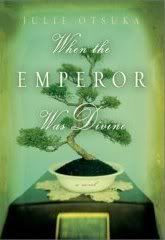 My second choice for the Japanese reading challenge - I was drawn to the lovely cover and the fact that the book itself is peppered with essays and multiple photos and illustrations.
My second choice for the Japanese reading challenge - I was drawn to the lovely cover and the fact that the book itself is peppered with essays and multiple photos and illustrations.Synopsis from Goodreads:
Komomo was a 12-year-old school girl living with her expat parents in China when she stumbled over a web site run by a former geisha. Three years later, she left home to enter the exclusive world of a geisha in training. In 2006, she fulfilled her dream and became the Geisha Komomo.
This is the first book to follow photographically over a number of years the life of a young woman from normal teenager to the rarified world of the Kyoto geiko, as geisha are called in that city.
This is a very visual book, largely photographs with extended captions and a few longer essays. Over 130 photographs will illustrate her growth, from her pre-Kyoto days in Beijing onward. A few of the photographs have been published in the English-language edition of Katei Gaho (which turned out to be the magazine's largest selling issue), but most have them have been seen nowhere else.
I'm going to start delving into this tonight in bed.














